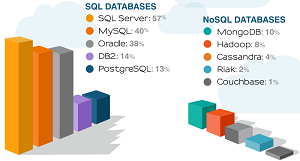Survey Shows SQL Dominates NoSQL in the Cloud
Recent research sponsored by Database as a Service (DBaaS) company Tesora shows SQL databases are holding their own in cloud usage.
The start-up, which is developing a DBaaS product for the open source Trove DBaaS project introduced in the April "Icehouse" release of the open source OpenStack cloud platform, today released a report titled ""Database Usage in the Public and Private Cloud: Choices and Preferences." More than 500 developers in North American open source developer communities responded, providing insights into database usage in public and private clouds.
Of those respondents, 79 percent were using a SQL database, while 16 percent were using NoSQL.
 [Click on image for larger view.] Which Databases Does Your Company Currently Use?(source: Tesora)
[Click on image for larger view.] Which Databases Does Your Company Currently Use?(source: Tesora)
"Use of relational databases remains well ahead of NoSQL, whether as a traditional database system or as a service, and whether it is provided in a public or private cloud," Tesora said in a news release announcing the new research.
The research report itself provided more details. "The leaders were the 'Big Three' relational databases: Microsoft SQL Server, MySQL and Oracle," it stated. "MongoDB was the most popular NoSQL DB with slightly more than 10 percent, behind all relational database choices."
So much for SQL becoming obsolete in the new era of Big Data, mobile and cloud computing.
The new findings echo recent similar research, such as a recent "data connectivity" study, and reports of SQL usage in Big Data scenarios.
The whole SQL-vs.-NoSQL thing should have been long over by now, but the new research must be heartening to SQL Server developers whose livelihoods seemed to be threatened by upstart database movements not that long ago.
SQL Server was reported in use by 57 percent of respondents, followed by MySQL (40 percent), Oracle (38 percent), DB2 (14 percent) and PostgresSQL (13 percent). "The results suggest that relational databases still dominate despite rapid adoption of NoSQL solutions by high-profile enterprises like Twitter and Facebook," the survey report said.
Of course, things might change.
"Going forward, this gap can be expected to close since NoSQL databases have only been on the market for a few years or less, as opposed to decades for some of the incumbents," the report stated. "The results seem to indicate the need for coexistence rather than displacement (at least in large, established organizations), with relational databases running in tandem with NoSQL for specialized workloads."
Microsoft didn't fare so well in some other areas. For example, Azure placed third in public cloud usage, at just 8 percent of respondents, behind Amazon AWS (24 percent) and Google Compute Engine (16 percent).
A report caveat noted: "This is a survey of open source software developers, and surveys of other groups will have different results."
Tesora used SurveyMonkey to conduct the survey (available for download after registration), while The Linux Foundation, MongoDB and Percona helped distribute it.
Posted by David Ramel on 06/18/2014